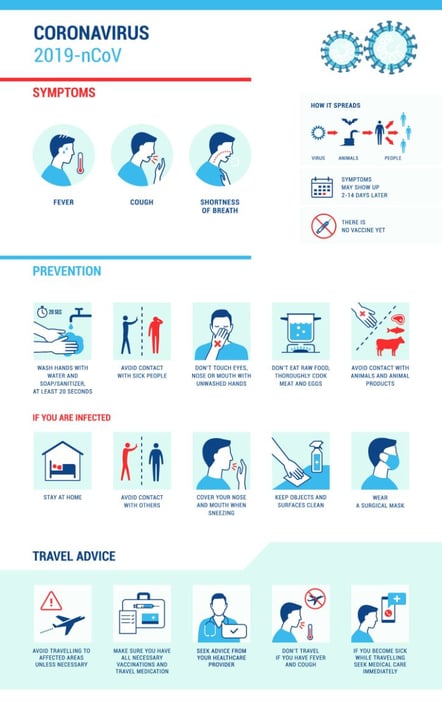3 min read
Most people start the new year surrounded by their loved ones, be it friends or family. New year's resolutions are made with music, dancing and a general buzz of joy in the air. However, for the Chinese city of Wuhan, new years eve celebrations were overshadowed with reports of pneumonia.
Chinese authorities quickly identified the cause as a new strain of coronavirus, a group of viruses that can cause illnesses ranging in severity from the common cold to pneumonia, Middle East respiratory syndrome-related coronavirus (MERS) and Severe acute respiratory syndrome (SARS).
What causes coronavirus?

Coronaviruses spread from animals to humans and while previously authorities believed that human to human transmission is unlikely, there are now cases being reported contradicting that. [Source] Thus precautions are necessary but before we dive into that, let's take a look at some of the symptoms.
The main symptoms of this coronavirus include:
- Respiratory symptoms (like those you have with a cold)
- Fever (high temperature)
- Cough
- Shortness of breath
- Breathing difficulties
However, in severe cases, it can also lead to pneumonia, kidney failure and can also prove to be fatal. With the widespread coverage on coronavirus, there is a lot of doubt and fear in the public's minds, but it is important to keep in mind that most cases are mild.
Serious cases are confined to the epicentre, Wuhan in people with preexisting health conditions or due to old age. Children seem to be less susceptible to the virus with no cases reported as of now. The fatality rate currently is at a meagre 2% of the total number of cases.
Coronavirus is said to have spread to Hong Kong, Japan, Singapore, Thailand, South Korea, the United States, Australia, France and Italy. At the time of writing, the 9th case of coronavirus has been confirmed in the UK.
What precautions should you take?
The World Health Organisation has listed out the measures that can hinder the spread of coronavirus as well as similar illnesses. These are: [Source]
- Wash your hands frequently with alcohol-based hand rub or soap and water
- When coughing and sneezing, cover your mouth and nose with a flexed elbow or a tissue. Then throw the tissue away immediately and wash your hands
- Avoid close contact with anyone who has fever and a cough
- If you have a fever, cough and difficulty breathing, seek medical care early and let the doctor or nurse know about your travel history
- If you’re visiting live markets in an area currently experiencing cases of novel coronavirus, avoid direct unprotected contact with live animals and surfaces in contact with animals
- Avoid consuming raw or undercooked animal products. Handle raw meat, milk or animal organs with care, to avoid cross-contamination with uncooked foods, as per good food safety practices
Wearing a medical mask can help limit the spread of some respiratory disease. However, using a mask alone is not guaranteed to stop infections and should be combined with other prevention measures including hand and respiratory hygiene and avoiding close contact – at least 1 metre (3 feet) distance between yourself and other people.
To sum it up:
 Coronavirus and insurance
Coronavirus and insurance
Insurers are getting a huge influx of calls from people that want to confirm if coronavirus treatments are covered by their health policies due to the wide scale panic growing in the minds of the people who are not comforted just by a webpage but need personal reassurances.
On the business side of it, there are two aspects: [Source]
- Businesses which depend on China for their manufacturing are facing huge disruptions in receiving the necessary products in time
- Businesses are also being forced to shut down due to lockdowns
This has led to a substantial increase in the number of claims reported for personal as well as corporate policies as well as policy holders calling to confirm the coverage of their policies. The result is an unprecedented number of calls to customer-facing staff for insurers culminating in high wait times and a ‘surge’.
And while the surge can pose a problem for insurers, we believe the larger problem at hand is the confusion prevalent in the minds of the public with respect to their insurance policies and the terms and conditions that go with it. In line with our mission to ‘help more people get better protected’,
Spixii believes that technology and digital transformation is the solution not only to absorb the surge but also to allow customers to have a detailed understanding of the policy they are buying.
